Thought leadership content is one of the key tools for building a strong brand. However, it requires more than just providing an opinion on a topic or offering new bits of information.
After surveying and interviewing over 300 marketers and industry experts, we’ve created a workflow for building a powerful thought leadership strategy.
In this article, we’ll tell you what thought leadership is, how to create effective thought leadership content, and how to use it to stand out and connect with your customers.
What Is Thought Leadership?
Thought leadership is the delivery of authentic and genuine content that uses the expertise, insight, and experience of the author, with the goal of sharing that wisdom with others.
Thought leadership is all about you creating value, building knowledge, and taking a stand.
Some argue that thought leadership is about presenting strong—and often controversial—opinions in a piece of content. This might entail taking an outspoken stand on a debatable industry issue.
Others maintain that thought leadership is about being a subject matter expert (SME) and leveraging that position to wield influence within a particular niche.
In reality, it’s a mixture of both.
According to our research, thought leadership is all about sharing inspirational, research-driven content that drives change and creates educational value.
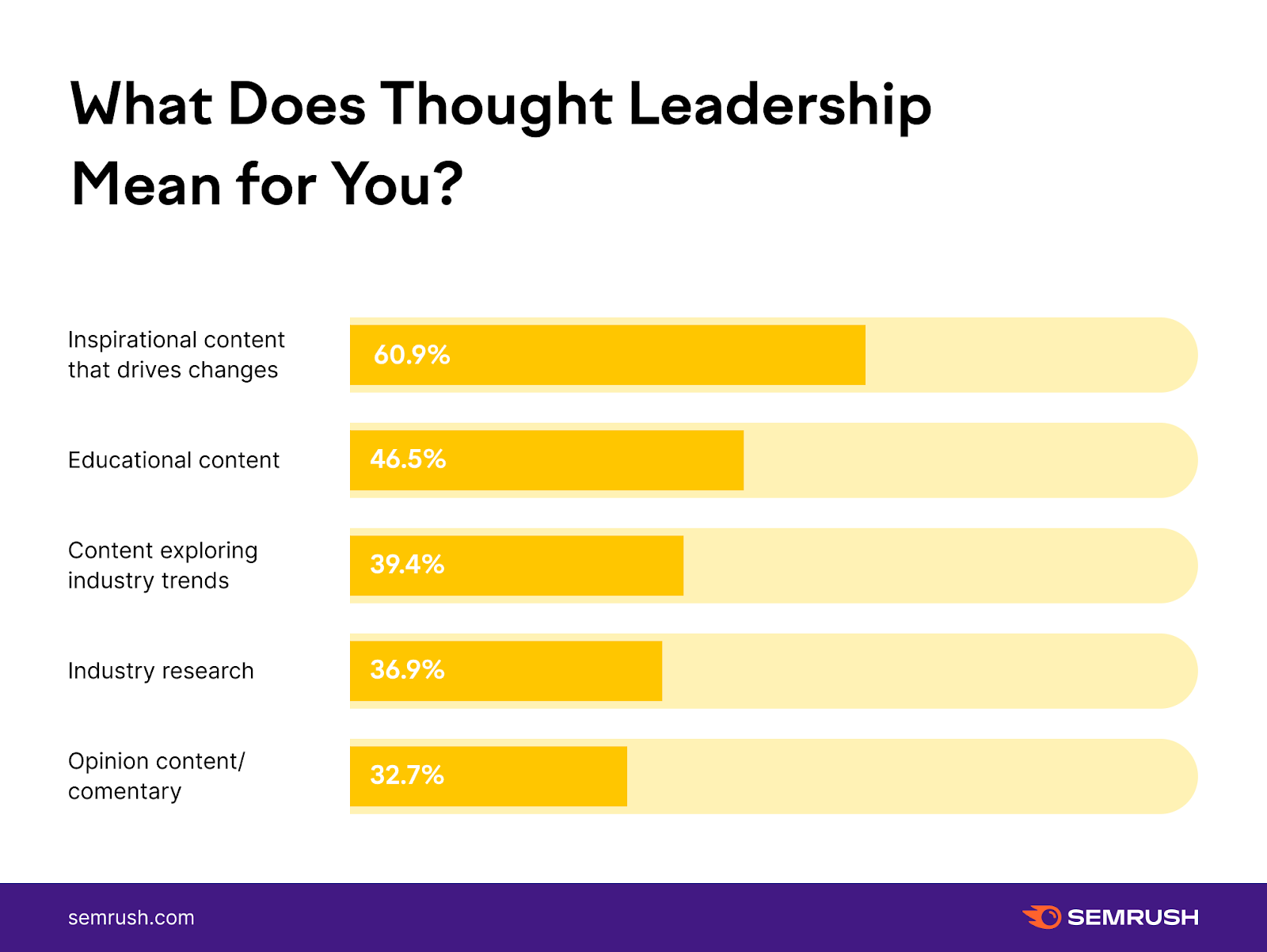
Thought leadership isn’t just about preaching to the masses, though. As Tim Gibbon, founder and director of Elemental Communications, explains:
There is also a strong cooperative element, with thought leadership allowing peers to collaborate, and share experiences, expertise, and knowledge.
Who Are Thought Leaders?
According to Orbit Media’s study, the best thought leaders are defined as experts in their field. Those experts could be CEOs, consultants, authors, coaches, or businesses (B2C and B2B).
Thought leaders are usually those with:
- Strong opinions
- Experience
- Knowledge
- Transparency
- A desire to share their wisdom with others
- The ability to think outside the box
Much of the thought leadership I see is really light, where the writers don’t share the real gems, tips, and actionable insights. True thought leaders are always ahead of the curve, and shouldn’t be concerned with giving away too much.
Overall, thought leaders usually have a desire to freely impart knowledge using company resources and data to back their opinions and expertise.
The Benefits of Thought Leadership Marketing
Let’s see how thought leadership can aid your company’s growth plans.

Quick facts:
- 65% of businesses already include thought leadership in their content marketing
- 29.5% more are planning to start doing so soon
Incorporating thought leadership into your wider content strategy can help in three ways.
1. Establish Brand Credibility and Authority
When you have something valuable and original to say, it better establishes your brand profile.
As your brand profile becomes more established, more people will care about what you have to say, making you an authority in your niche.
Thought leadership also reinforces your brand story.
You can push important ideas that you want your audience to believe in and drive a change in their perspective.
2. Generate Backlinks, Shares, and Mentions
In itself, thought leadership is not necessarily an SEO strategy. However, it can still increase the likelihood of people linking to your content and strengthening your SEO profile.
If your content includes valuable opinions, research, and data, it can naturally encourage others to share and reference your content.
That said, you shouldn’t publish thought leadership articles only for the purpose of generating likes, shares, and backlinks. This dilutes your content and lessens its impact.
3. Attract Potential Clients
Thought leadership content is not intended to convert prospects directly. Nonetheless, it helps you build a loyal audience and attract potential customers.
Geri Stengel, founder and president of Ventureneer, is a good example of someone who gained new clients thanks to her thought leadership.
As a result of my thought leadership on women entrepreneurs and entrepreneurial funding, I have gotten clients. In other cases, clients haven’t needed to check references because they knew what I stood for.
To illustrate, Seed is a probiotics brand focused on showing how bacteria affect our health as a whole.
Instead of simply promoting their product, they opt to educate users about the science and sustainability behind probiotics.
With their “probiotics are a science” approach, they offer a new way to take care of your health. All this helped them boost their brand awareness and build a significant following.

Now that you know what thought leadership is and why it should matter to your organization, how can your content help position you as a thought leader?
How To Build a Powerful Thought Leadership Strategy
There is no one-size-fits-all approach to implementing a thought leadership strategy. Many elements depend on the stature and makeup of your business.
As a general guide, here are six core steps to follow, regardless of your company’s size and reputation.
Step 1: Define Your Goals
The first step with any strategy is to identify what you want to achieve when you position yourself as a thought leader.
To do this, consult your existing marketing goals and consider how thought leadership can help you achieve each one—if indeed it can.
If your goal is to raise awareness of your brand—and the solutions it offers—then a thought leadership piece about accessibility issues facing consumers in your industry, for example, can help you get people’s attention.
Defining Your Audience
An essential part of this step is to also clearly define who your audience is.
These people should be aligned with your buyer persona(s), although you should also consider who might benefit the most from hearing what you have to say.
Keep in mind that your audience may not always be your buyers but may expand to include potential buyers.
For instance, are you looking to communicate directly with other CEOs? Purchasing decision-makers? Marketing managers?
Ideally, you want to reach wider audiences who help spread awareness about your company, become part of your community, and act as brand advocates.
Step 2: Review Existing Thought Leadership
Now it’s time to do some research and see what kind of thought leadership already exists in your niche. This includes analyzing both you and your competitors.
Explore various communication channels in your industry like:
- Online forums and communities
- News resources (online and offline)
- Trade publications and journals (online and offline)
- Personal brand platforms, such as LinkedIn and Medium
- Company blogs
- Social media
- Webinars and seminars
- Conferences
Increase your knowledge of what the current thought leadership trends and ideas are. This will help you get a better understanding of the main issues in your industry.
It will also allow you to familiarize yourself with who its primary thought leaders currently are.
Pay attention to your competitors, too.
What kinds of stances are they taking? How are they delivering their thought leadership content, if at all?
Analyze what they’re doing and then apply that knowledge to your thought leadership strategy.
Finally, don’t forget to look internally.
Go through your company’s previous blog posts or communications to assess your organization’s past opinion on certain topics.
This ensures you don’t accidentally alienate existing customers with a new and controversial idea that contradicts a previous position.
Step 3: Identify Your Organization’s Focus and Its Thought Leaders
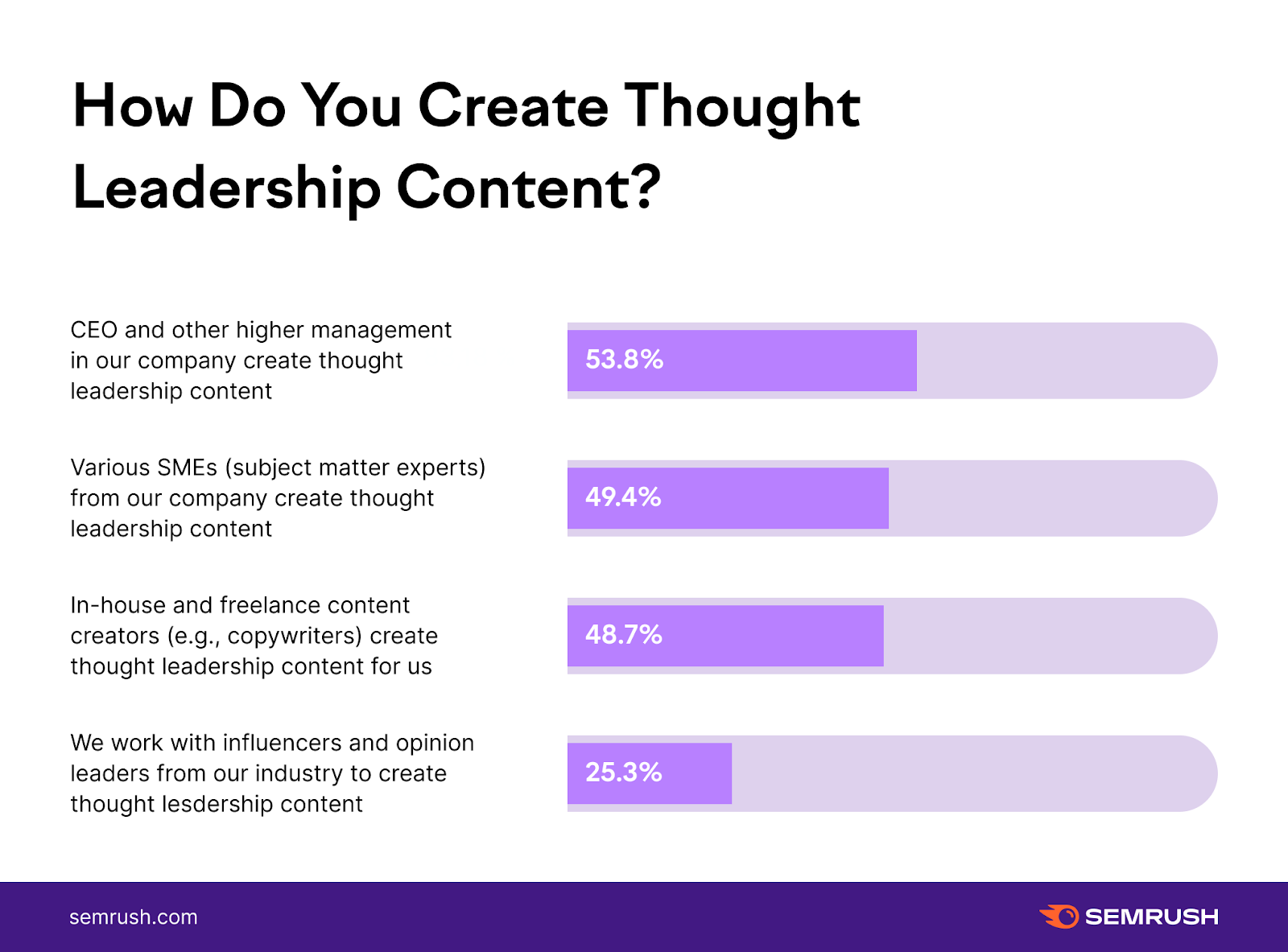
Quick facts:
- CEOs and other high-level managers create thought leadership content in over 50% of companies
- Subject matter experts (SMEs) of all kinds create content in 49.4% of businesses
- 48.7% of companies also let in-house and freelance copywriters take over this task
- 25.3% of thought leaders work with influencers and opinion leaders from their industry
Next, you’ll need to understand where your thought leadership lies on an organizational level.
For instance, as a company, what is your expertise? What do you specialize in?
Consider your wider brand story and beliefs. Is there a bigger agenda or change you are seeking to make as a company?
These are good starting points when deciding who your company’s authentic and revolutionary thought leaders are going to be.
How To Identify Thought Leaders
If you want to talk about a variety of topics, it’s a good idea to build a roster of thought leaders. Think about the key experts working at or with your company.
Based on our conversations with industry experts, thought leader role models usually have these five things in common:
- Alignment with Your Brand and Its Values: If your thought leaders are not firm believers in your brand and are not aligned with your story and your position, then it’s unlikely to work.
- Strong Opinions, Innovative Ideas, and Concepts: The risk of making someone unhappy about your beliefs will always be there—and that’s totally fine. However, innovators who take a stand can turn into true thought leaders.
- Industry Knowledge and Expertise: Another thing that can truly move the needle is passion. Being both knowledgeable and passionate about what you do will naturally make others follow.
- Experience Publicly Sharing Experiences: This can include writing and speaking skills, past appearances on webinars, and events. It’s also helpful if they can “prove” their credibility with credentials or memberships with relevant associations.
- A Loyal Following: This goes beyond having a social media following. It may mean that you’re the reliable source a business runs to when they need to solve a problem.
However, a loyal following comes with time. Some thought leaders will grow together with their company.
Many brands have their internal SMEs create thought leadership content.
For example, YouTube’s CEO Susan Wojcicki created an animated series, “Creator Letters,” where she gave her thoughts on YouTube’s plans, video content, and vlogging in general.
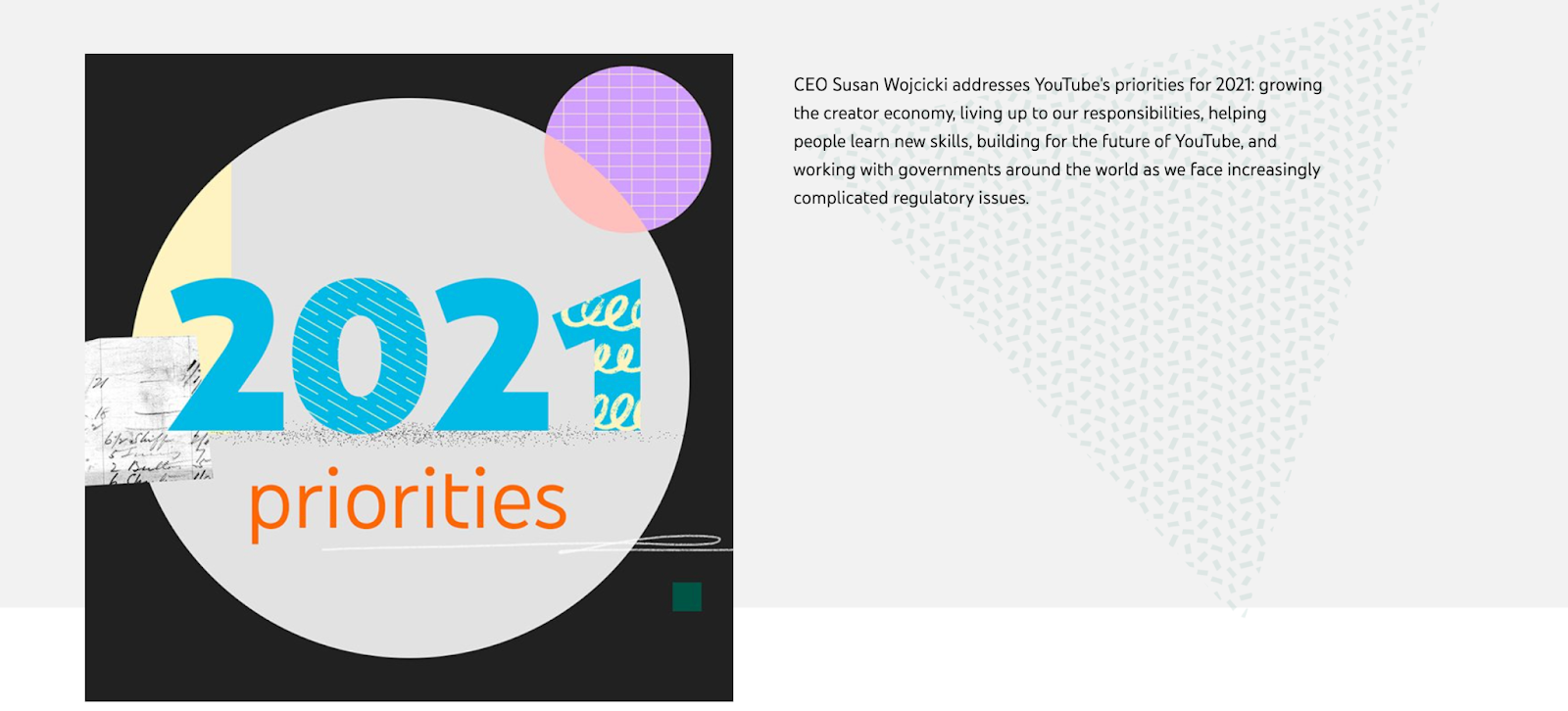
These creative animations supplement her message and add a more emotive element to thought leadership, structuring it as a story rather than a seminar.
Another example of producing thought leadership content with your company’s C-suite leaders is this blog post by N-26 featuring the company’s CGO, Alexander Weber.
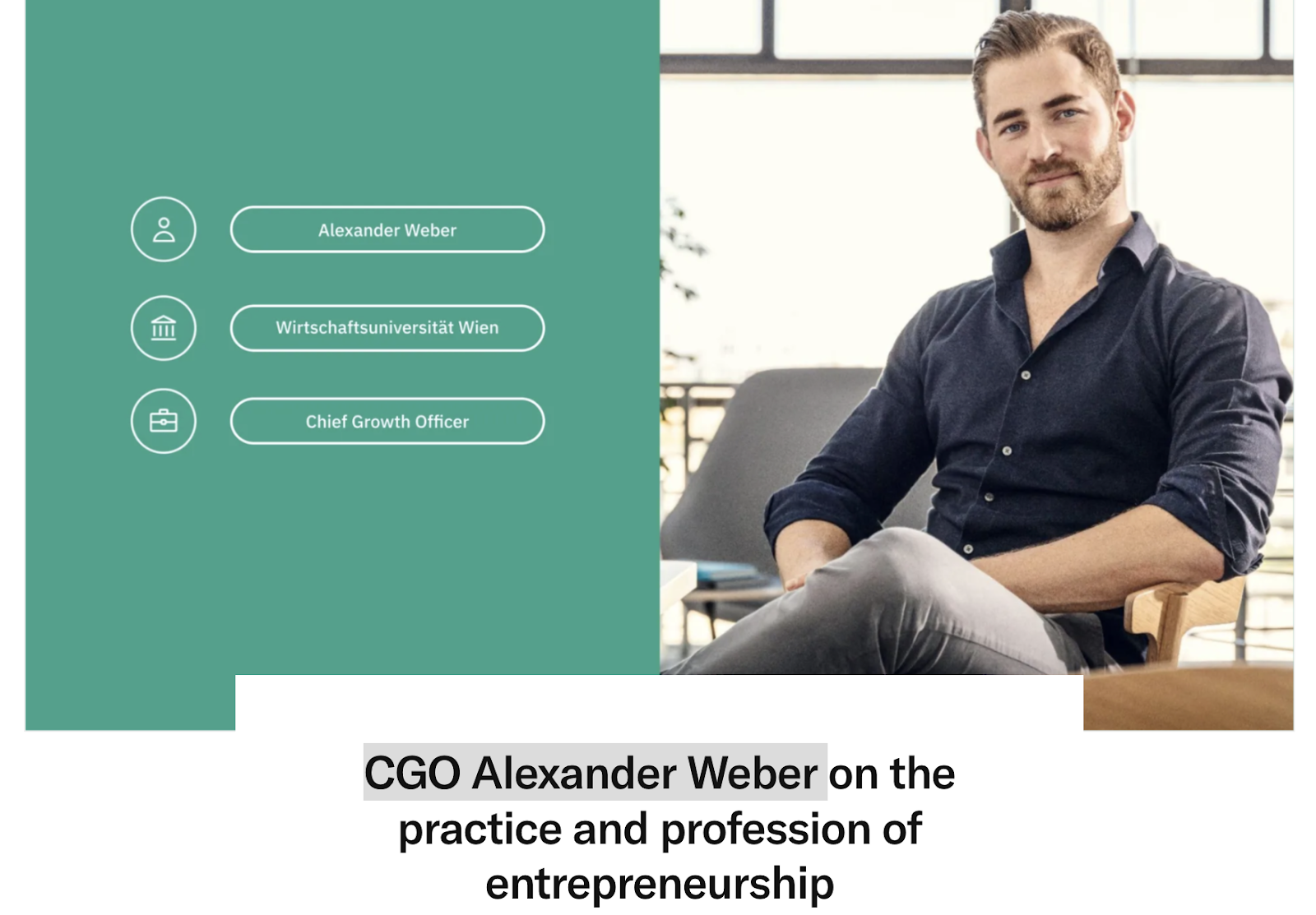
Step 4: Create Your Thought Leadership Content
The next step is to actually start creating your content, so here are a few quick stats on the types of content thought leaders create.

Quick facts:
- 91.4% of organizations doing thought leadership create articles
- 44.1% create video
- 36.2% include speaking at webinars or events
- 33.2% choose white papers as a format for thought leadership
Writing articles as a part of your thought leadership strategy is a good place to start. Once you feel you have a healthy process for creating articles, try other areas like video, webinars, podcasts, and ebooks.
But before you start crafting content, determine what topics you want to cover.
Research Topics
There’s no one exact way to source thought leadership content.
When sourcing thought leadership content, use your goals and audience to generate content ideas. Staying clued in on the latest trends in your niche and learning from others in your field is also helpful.
Doing this allows you to get an idea of the issues your audience cares about and ensures your content gets traction quickly.
Some other great ideas for thought leadership content include:
- Unique experiences from you or other thought leaders
- A strong opinion embraced in your company that goes against the industry norm
- Unique data and statistics you can access through your business
- Industry research and insights from company resources or SMEs
- Collaboration with customers, partners, opinion leaders, and influencers
- Key learnings from your personal story and background
Leveraging specialist tools that help with Topic Research can also make discovering trending topics easier. Trending content topics for your chosen SEO keywords can provide you with a wealth of potential ideas.
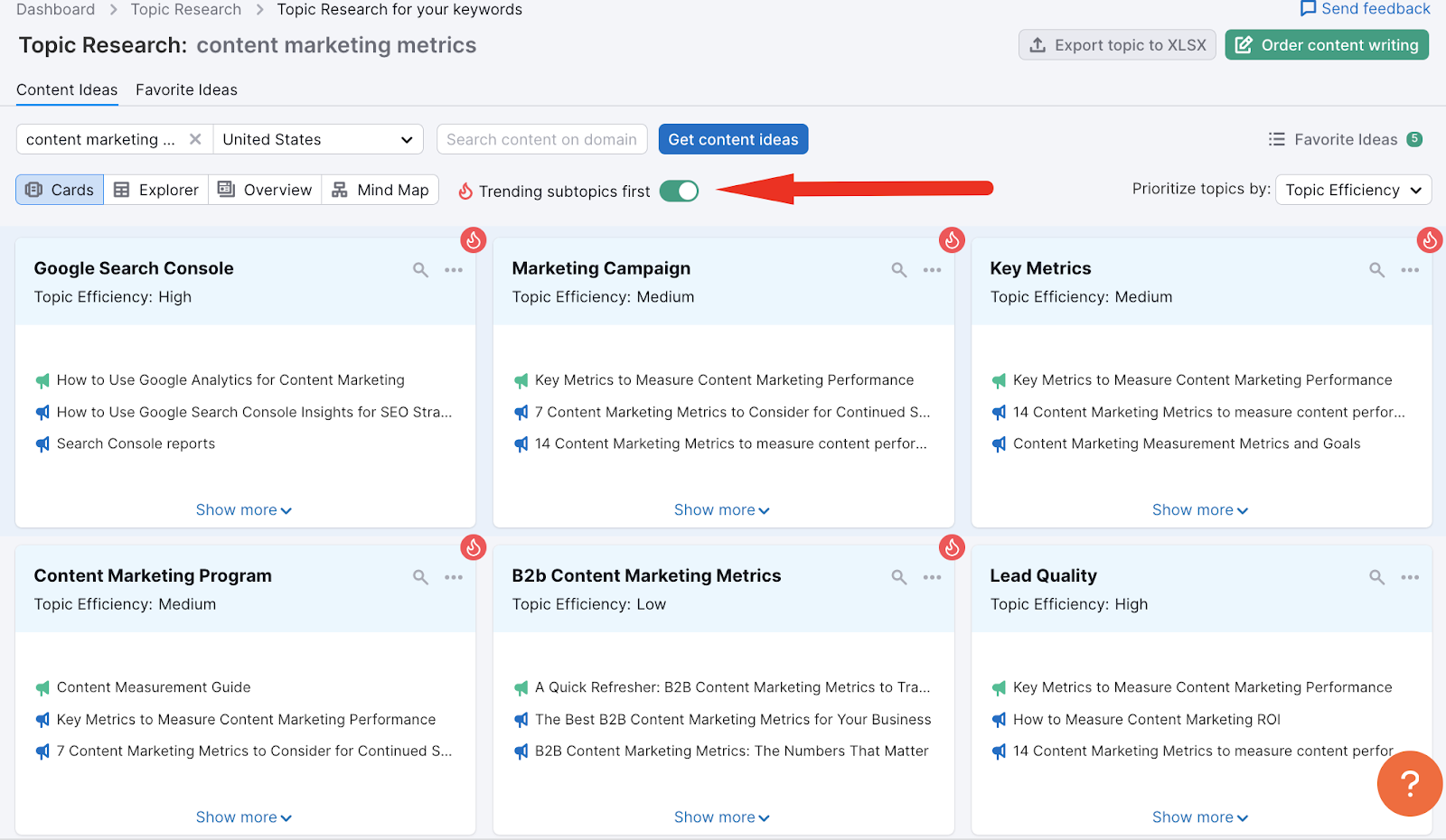
Map Out the Content Production Process
You should also consider how the content will be produced.
As you start to build your content plan and assign topics to your thought leaders or content creators, a critical step is to determine who will actually produce the content.
- Is the thought leader going to write it themselves?
- Will it be ghostwritten?
- Will it be structured as an interview on a podcast?
- Should I outsource my content for creation?
- Are there tools that can help me with content creation?
It’s a plus to have thought leaders who are also good writers.
It can also be extremely useful to have internal SMEs, if they exist at your organization, create thought leadership content.
However, if you think that asking your internal thought leaders or SMEs is too much of a burden or that their writing skills are far from perfect, you can always work with a professional copywriter for written content.
A vetted copywriter could interview the thought leaders or SMEs and turn this information into appealing content.
Then, it’s essential to ensure that each content piece corresponds to a high-quality standard and creates an enjoyable user experience.
For example, you can use Semrush’s SEO Writing Assistant tool to optimize written text for users and search engines.
Simply paste the content into the tool or use the convenient add-ons—Google docs, Word docs, or WordPress—and get an instant assessment of your copy across four pillars: SEO, readability, tone of voice, and originality.
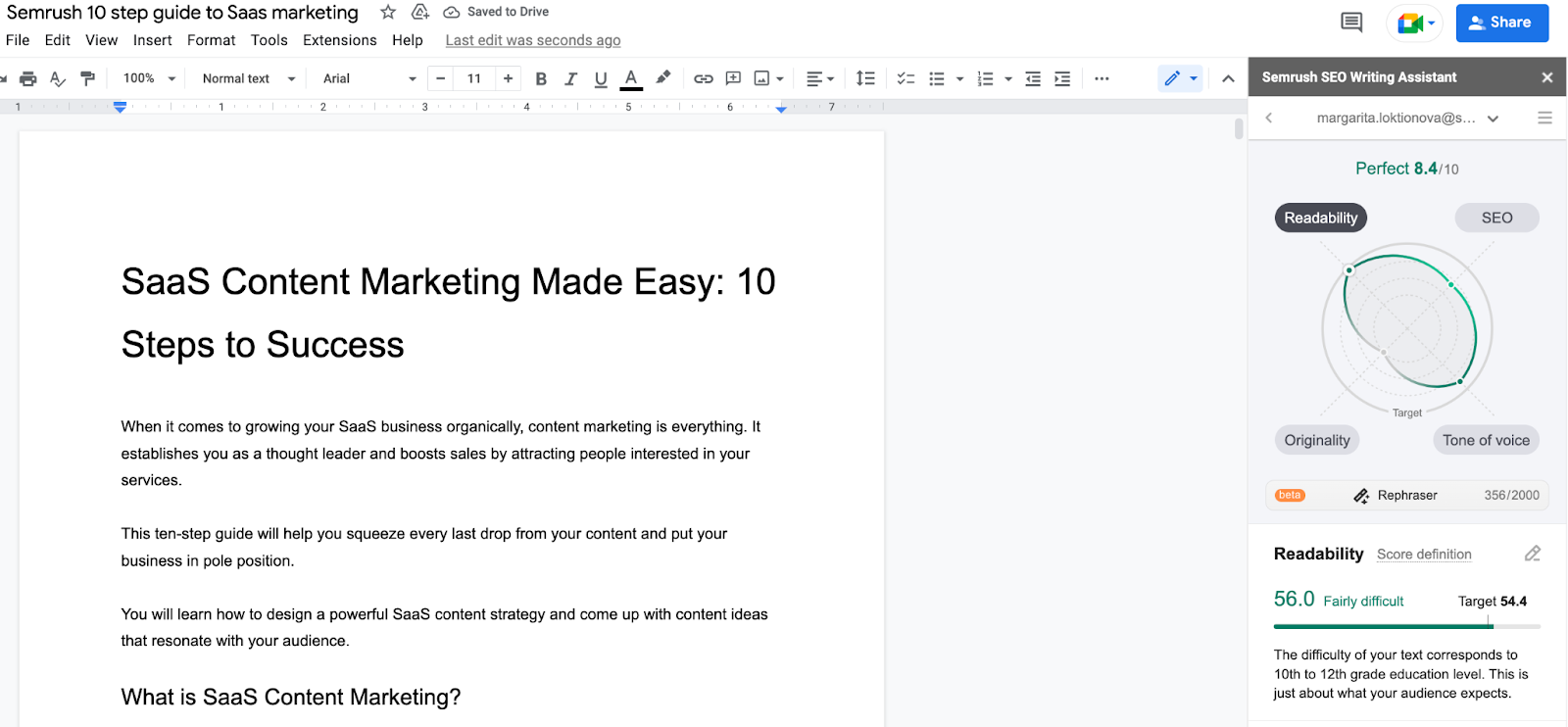
Stay Flexible
It’s important that you stay fluid in terms of editorial and publishing calendars. Trends and emerging news can change quickly, so always be prepared to react accordingly.
Podcasts, for example, can be a great way to quickly create and deliver timely content.
For instance, Refinitiv’s Sustainability Perspectives podcast became an important channel for producing ad-hoc content and driving the brand’s thought leadership in the ESG sector.

Having industry experts as guest speakers at each episode and addressing the most pressing agenda can be a powerful and cost-effective way to reach your audience.
Step 5: Distribute and Promote Your Content
You can create the most interesting, useful, and insightful content, but it will do very little if no one can find it online.
Strategies and tactics around the distribution and promotion of your thought leadership content—and any valuable content, for that matter—are vital components of a thought leadership campaign.
Recommendations for Distributing Your Thought Leadership Content
Depending on your business, you can effectively promote content in a few different ways.
If your thought leaders already have their own network of contacts willing to help promote their thought leadership, then the content is more likely to generate engagement and feedback.
Small businesses and startups may find it more difficult to get exposure. If this is the case for you, consider these tactics:
- Promote on internal and external company channels: Promote content on your company’s channels or ask others within your organization to share it. For larger businesses, tools like GaggleAMP might be of use.
- Pitch to journalists, publications, and other industry influencers: Authentic and opinionated thought leadership content can generate extra attention and interest with publications. Services like Help a Reporter can help with making pitches.
- Collaborate with non-competing brands: Work with others in your sector to produce joint thought leadership content. It helps to form alliances if you are trying to push the same agenda (e.g., digitalization in your sector).
- Team up with opinion leaders and influencers: Reach out to relevant opinion leaders and influencers to get contributions—and extra promotional support—for your thought leadership content. Consider asking for quotes and interviews.
- Analyze content creators in your industry: Find out what they’re talking about and create relevant content that encourages them to share it. For example, it could be something that validates their point of view or provides new insights on the topic.
If you have a budget for paid promotion, consider adding sponsored content to your strategy.
For example, if you posted a thought leadership article on your blog, repurpose it into a blog post published by a third party. You could also have the blog’s author appear on sponsored webinars, events, and podcasts.
The Importance of Content Engagement
Thought leadership is about creating a conversation. So, follow through and engage directly with the communities, leaders, players, and influencers who are discussing your piece.
In a larger organization, you may have brand or reputation management personnel who can handle this. However, in a smaller organization, your thought leader may need to be more involved.
You can also search community platforms, forums, Slack channels, and other spaces to connect with experts in your field.
For example, if your target customers are members of the startup world, you might want to be active on platforms like GrowthHackers and GrowthMentor.
Step 6: Measure the Results
As with any tactic, it’s important to measure the performance of your thought leadership marketing to see if you are reaching your goals. Several content metrics can be helpful in measuring performance metrics and sales outcomes.
Here are the key types of results you can generate from thought leadership content, based on our research:
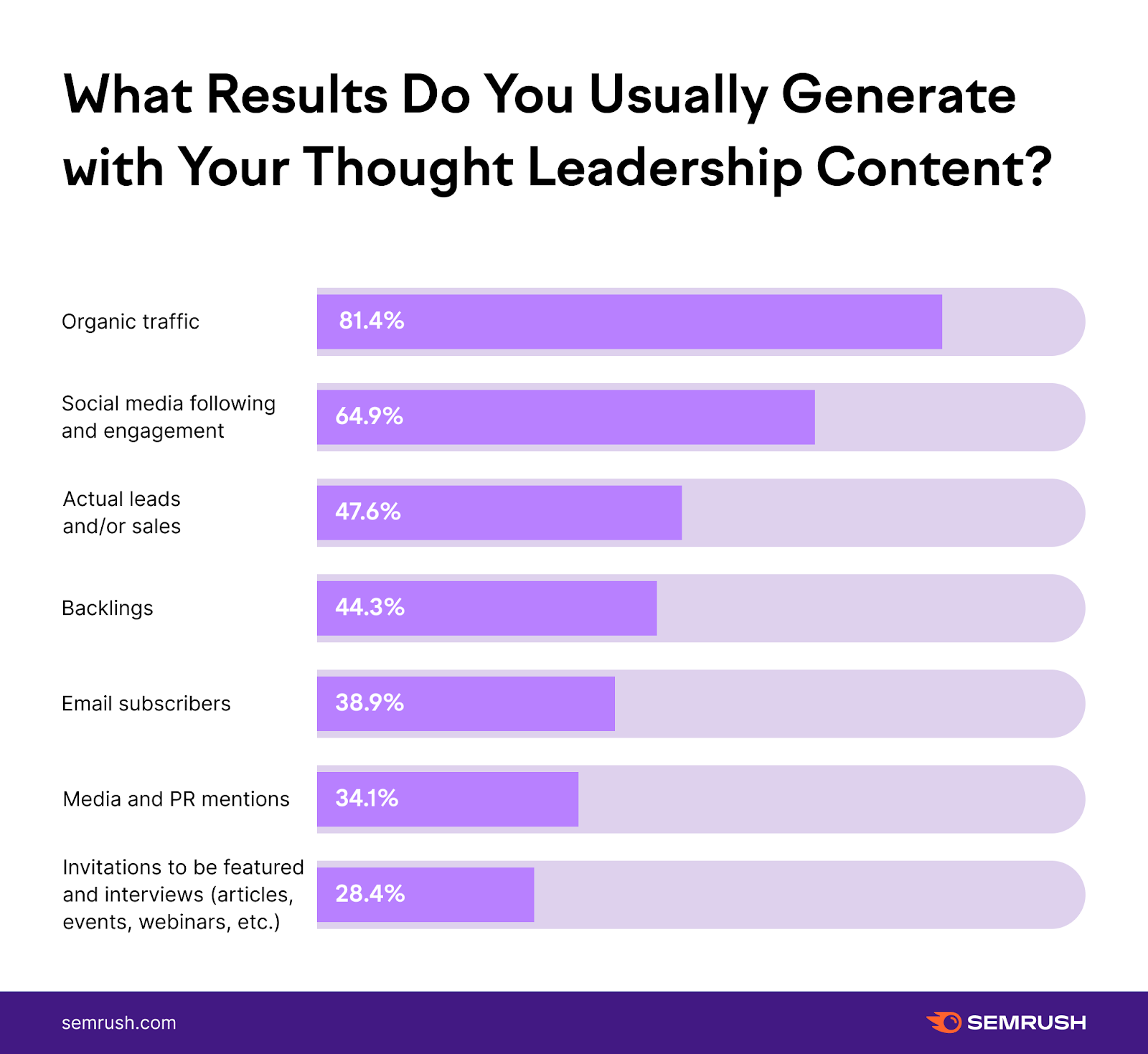
Quick facts:
- 81.4% of thought leadership content results in organic traffic
- 64.9% see a boost in social media following and engagement
- 47.6% of thought leadership content generates the actual leads and sales
Don’t be afraid to get a little creative about how you measure your goals.
For example, Erin Browner, a content manager at Clever Inc., regularly hosts thought leadership webinars and sends out rating-based surveys to all attendees after each event. She also monitors whether her webinars have attracted the right target audience.
“If, for instance, we are seeking to engage with directors, we’ll measure how many have registered and attended,” she says.
For Browner, this metric is far more important than the overall number of registrants and attendees.
Challenge the Norm with Your Thought Leadership
Thought leadership requires authenticity, deep expertise, and ideas that strive to challenge the conventional ways of thinking and acting.
To communicate thought leadership effectively, it needs to take the form of high-quality content on relevant topics that your audience really cares about.
Therefore, it’s crucial to conduct in-depth topic research and put out content that is engaging and unique.
To enhance and reinforce your thought leadership content strategy in 2024, explore our State of Content Marketing 2023 Global Report.
